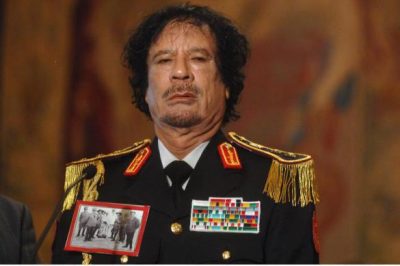Narrative and Reality of the Libyan Crisis

All Global Research articles can be read in 51 languages by activating the “Translate Website” drop down menu on the top banner of our home page (Desktop version).
To receive Global Research’s Daily Newsletter (selected articles), click here.
Visit and follow us on Instagram at @globalresearch_crg.
***
NATO expresses concern over the crisis in Libya, which “has direct implications for regional stability and the security of all Allies.” It therefore assures that it “remains committed to providing Libya with defense and security advice”. The governments of the US, France, Germany, Italy and the UK declare that “free elections will allow the Libyan people to strengthen their sovereignty” and that they are “ready to hold to account those who threaten Libya’s stability.” They reaffirm then “the full respect and commitment to the sovereignty and independence of Libya”.
Solemn words pronounced by the same powers that, after having demolished Yugoslavia in the nineties, disintegrating it from the inside and attacking it from the outside, with the same technique demolished the Libyan State in 2011. First they financed and armed inside tribal sectors and Islamic groups hostile to the government, and infiltrated special forces, in particular from Qatar, to make armed clashes flare up. Then they attacked it from outside: in seven months, the US/NATO air force carried out 30 thousand missions, 10 thousand of which were attacks, with over 40 thousand bombs and missiles. Italy participated in the war — directed by the United States, first through the Africa Command, then through NATO under US command — with 7 air bases, fighter-bombers and an aircraft carrier.
The African state was thus demolished, a state that — documented in 2010 by the World Bank — had “high levels of economic growth and human development”. Thanks to energy exports, the Libyan government had invested nearly 150 billion dollars abroad. Libyan investments in Africa were crucial to the African Union’s plan to create its own financial bodies, a common market and a single African currency. Emails from the Secretary of State of the Obama administration, Hillary Clinton, later brought to light by WikiLeaks, show that the United States and France wanted to eliminate Gaddafi before he used Libya’s gold reserves to create a pan-African currency alternative to the dollar and the Cfa franc (the currency imposed by France on 14 former colonies). Before the bombers went into action, the banks went into action: they seized the 150 billion dollars invested abroad by the Libyan government, most of which has since disappeared, thus blocking the entire African project.
All of this has been erased in the political-media narrative of the Libyan crisis, allowing those primarily responsible for the social catastrophe caused by the war on Libya to present themselves as its saviors. Today in Libya the revenues from energy exports are hoarded by militias and multinationals. Large quantities of Libyan oil are sold by smugglers to European Union countries, through Maltese companies that recycle it, disguising its origin. The standard of living of the population has collapsed. Libya has become the main transit route of a chaotic migratory flow that has caused more victims than the war of 2011. According to IOM data, about 1,500 migrants drowned in the Mediterranean in 2021, but they are certainly more since many cases are not reported. About 30 thousand migrants, in 2021, were intercepted at sea and brought back to Libya by the “Libyan” Coast Guard, created, trained and financed by Italy with 33 million euros. Many ended up in detention centers of both the “government” in Tripoli and the militias. Today more than 600,000 migrants of around 45 nationalities are trapped in Libya, practically reduced to a state of slavery, forced to work without pay and beaten. More and more are those who ask not to be brought to Europe, but to return to their countries to escape this condition. Particularly dramatic is that of young women, sold at auction, raped and forced into prostitution.
All this thanks to the operation “Unified Protector” that, informs the Italian Ministry of Defense, was carried out by NATO in 2011 for “the protection of civilians in Libya”.
*
Note to readers: Please click the share buttons above or below. Follow us on Instagram, @crg_globalresearch. Forward this article to your email lists. Crosspost on your blog site, internet forums. etc.
This article was originally published in Italian on Il Manifesto.
Manlio Dinucci, award winning author, geopolitical analyst and geographer, Pisa, Italy. He is a Research Associate of the Centre for Research on Globalization (CRG).

